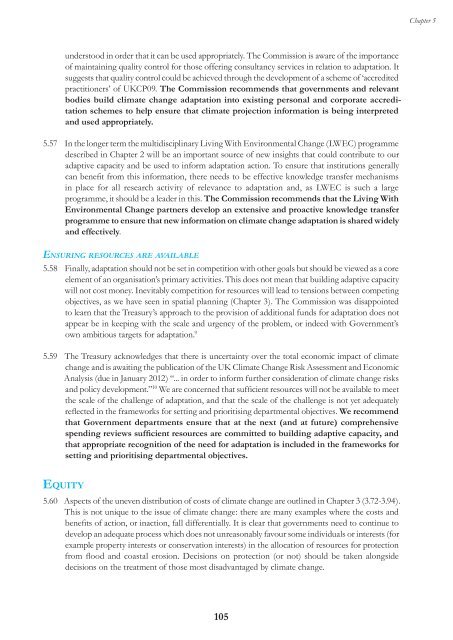Twenty-eighth Report Adapting Institutions to Climate Change Cm ...
Twenty-eighth Report Adapting Institutions to Climate Change Cm ...
Twenty-eighth Report Adapting Institutions to Climate Change Cm ...
Create successful ePaper yourself
Turn your PDF publications into a flip-book with our unique Google optimized e-Paper software.
5.57<br />
unders<strong>to</strong>od in order that it can be used appropriately. The Commission is aware of the importance<br />
of maintaining quality control for those offering consultancy services in relation <strong>to</strong> adaptation. It<br />
suggests that quality control could be achieved through the development of a scheme of ‘accredited<br />
practitioners’ of UKCP09. The Commission recommends that governments and relevant<br />
bodies build climate change adaptation in<strong>to</strong> existing personal and corporate accreditation<br />
schemes <strong>to</strong> help ensure that climate projection information is being interpreted<br />
and used appropriately.<br />
In the longer term the multidisciplinary Living With Environmental <strong>Change</strong> (LWEC) programme<br />
described in Chapter 2 will be an important source of new insights that could contribute <strong>to</strong> our<br />
adaptive capacity and be used <strong>to</strong> inform adaptation action. To ensure that institutions generally<br />
can benefit from this information, there needs <strong>to</strong> be effective knowledge transfer mechanisms<br />
in place for all research activity of relevance <strong>to</strong> adaptation and, as LWEC is such a large<br />
programme, it should be a leader in this. The Commission recommends that the Living With<br />
Environmental <strong>Change</strong> partners develop an extensive and proactive knowledge transfer<br />
programme <strong>to</strong> ensure that new information on climate change adaptation is shared widely<br />
and effectively.<br />
ENSURING RESOURCES ARE AVAILABLE<br />
5.58<br />
5.59<br />
Finally, adaptation should not be set in competition with other goals but should be viewed as a core<br />
element of an organisation’s primary activities. This does not mean that building adaptive capacity<br />
will not cost money. Inevitably competition for resources will lead <strong>to</strong> tensions between competing<br />
objectives, as we have seen in spatial planning (Chapter 3). The Commission was disappointed<br />
<strong>to</strong> learn that the Treasury’s approach <strong>to</strong> the provision of additional funds for adaptation does not<br />
appear be in keeping with the scale and urgency of the problem, or indeed with Government’s<br />
own ambitious targets for adaptation. 9<br />
The Treasury acknowledges that there is uncertainty over the <strong>to</strong>tal economic impact of climate<br />
change and is awaiting the publication of the UK <strong>Climate</strong> <strong>Change</strong> Risk Assessment and Economic<br />
Analysis (due in January 2012) “... in order <strong>to</strong> inform further consideration of climate change risks<br />
and policy development.” 10 We are concerned that sufficient resources will not be available <strong>to</strong> meet<br />
the scale of the challenge of adaptation, and that the scale of the challenge is not yet adequately<br />
reflected in the frameworks for setting and prioritising departmental objectives. We recommend<br />
that Government departments ensure that at the next (and at future) comprehensive<br />
spending reviews sufficient resources are committed <strong>to</strong> building adaptive capacity, and<br />
that appropriate recognition of the need for adaptation is included in the frameworks for<br />
setting and prioritising departmental objectives.<br />
EQUITY<br />
5.60<br />
Aspects of the uneven distribution of costs of climate change are outlined in Chapter 3 (3.72-3.94).<br />
This is not unique <strong>to</strong> the issue of climate change: there are many examples where the costs and<br />
benefits of action, or inaction, fall differentially. It is clear that governments need <strong>to</strong> continue <strong>to</strong><br />
develop an adequate process which does not unreasonably favour some individuals or interests (for<br />
example property interests or conservation interests) in the allocation of resources for protection<br />
from flood and coastal erosion. Decisions on protection (or not) should be taken alongside<br />
decisions on the treatment of those most disadvantaged by climate change.<br />
105<br />
Chapter 5
















